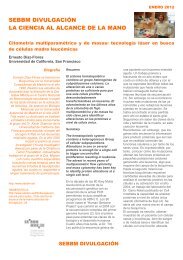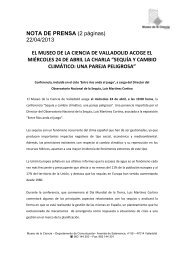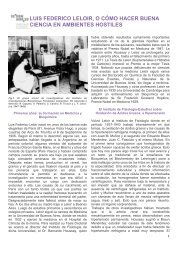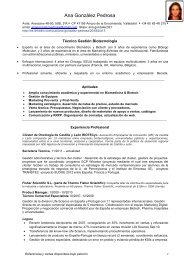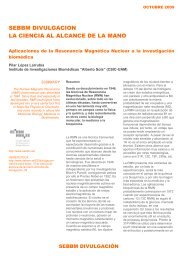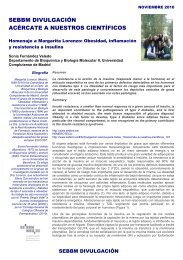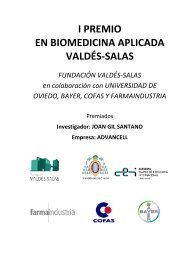The Spanish Society of Biochemistry and Molecular ... - SEBBM
The Spanish Society of Biochemistry and Molecular ... - SEBBM
The Spanish Society of Biochemistry and Molecular ... - SEBBM
Create successful ePaper yourself
Turn your PDF publications into a flip-book with our unique Google optimized e-Paper software.
SPANISH SOCIETY OF BIOCHEMISTRY AND MOLECULAR BIOLOGY<br />
273<br />
Science (1986) fostered rapid scientific growth. <strong>The</strong> entry <strong>of</strong><br />
Spain into NATO (1981/1986), <strong>and</strong> particularly into the European<br />
Union (1986) completed the process <strong>of</strong> normalization <strong>of</strong><br />
the international links with Spain. During these years <strong>of</strong> Socialist<br />
Party rule, Spain established the workings <strong>of</strong> its science system,<br />
based on the competitive funding <strong>of</strong> science <strong>and</strong> <strong>of</strong> peer<br />
review orchestrated by a neutral evaluation agency (ANEP),<br />
with funds provided by a 4-year National Plan, <strong>and</strong> with an<br />
Inter-ministerial Committee administering <strong>and</strong> overseeing the<br />
process. A number <strong>of</strong> <strong>Spanish</strong> biochemists including prominently<br />
the late Roberto Fernández de Caleya, were among the<br />
group <strong>of</strong> scientists that drew the basic lines <strong>of</strong> the system. <strong>The</strong><br />
entry into the EU greatly spurred research thanks largely to<br />
the skills <strong>of</strong> <strong>Spanish</strong> negotiators that introduced the Structural<br />
Funds (FEDER) <strong>and</strong> the idea <strong>of</strong> positive discrimination for science<br />
initiatives that included groups from the countries being<br />
accepted into the EU (Portugal, Spain <strong>and</strong> Greece at the time).<br />
Never again, as in the immediate years after incorporation into<br />
the EU, has Spain had such a large mass <strong>of</strong> <strong>Spanish</strong> scientists<br />
leading or participating in European initiatives. This had a great<br />
impact in setting strong links between <strong>Spanish</strong> <strong>and</strong> European<br />
groups <strong>and</strong> in rendering <strong>Spanish</strong> scientists very accustomed to<br />
the day-to-day uses <strong>of</strong> international science. On the other h<strong>and</strong>,<br />
Structural funds have pumped money into the science system<br />
<strong>and</strong> into the building <strong>of</strong> new scientific institutes <strong>and</strong> the incorporation<br />
<strong>of</strong> scientific infrastructures. This has allowed to close<br />
the gap between the meager science funding <strong>of</strong> the pre-EU era,<br />
<strong>and</strong> the more up-to-date funding <strong>of</strong> nowadays. With the entry <strong>of</strong><br />
Eastern European countries in the EU, Spain is losing its privileged<br />
position as a receiver <strong>of</strong> Structural funds, but, nevertheless,<br />
it would not be expected that the country were to revert to<br />
lower science budgets, although growth might slow down.<br />
TODAY’S SPANISH BIOCHEMISTRY AND MOLECULAR<br />
BIOLOGY IN PERSPECTIVE<br />
When the state <strong>of</strong> <strong>Spanish</strong> <strong>Biochemistry</strong>, <strong>Molecular</strong> Biology<br />
<strong>and</strong> allied disciplines <strong>of</strong> today is compared with the state prevailing<br />
30 years ago, there are reasons for being proud. After<br />
coming to a st<strong>and</strong>still in the late 80s <strong>and</strong> early 90s, funds for<br />
science have steadily increased in Spain, <strong>and</strong> the public contribution<br />
is nowadays 1% <strong>of</strong> the GNP, with the present government<br />
having tried hard (although not fully succeeding) to keep<br />
its word to increase research funds by 25% yearly (25). Science,<br />
<strong>and</strong> particularly biomedical <strong>and</strong> molecular disciplines, are in the<br />
limelight <strong>of</strong> <strong>Spanish</strong> life (26). Press records <strong>of</strong> biological <strong>and</strong><br />
biomedical advances are numerous <strong>and</strong> quite accurate. <strong>Spanish</strong><br />
biochemists <strong>and</strong> molecular biologists are visible in international<br />
journals <strong>and</strong> in scientific forums such as congresses <strong>and</strong> meetings.<br />
New Statutes for the CSIC were approved in 1993 <strong>and</strong><br />
2000, <strong>and</strong> this research institution, <strong>of</strong> which about 50% is biological-biomedical,<br />
has grown steadily, being now the center <strong>of</strong><br />
a change <strong>of</strong> status to adapt it to the challenges <strong>of</strong> 21st century<br />
research. <strong>The</strong> University has modified again its rules in 2007, in<br />
part to facilitate the recruitment <strong>of</strong> scientists. <strong>The</strong> Ramón y<br />
Cajal <strong>and</strong> Juan de la Cierva programs have allowed recruitment<br />
<strong>of</strong> many senior <strong>and</strong> junior postdocs. <strong>The</strong> Ministry <strong>of</strong> Health has<br />
taken up biomedical research as the centerpiece <strong>of</strong> its performance,<br />
<strong>and</strong> has opened physical (CNIO <strong>and</strong> CNIC) <strong>and</strong> virtual<br />
centers for biomedical research (seven Centros de Investigación<br />
Biomédica en Red, or, in short, CIBERs; <strong>and</strong> even more Networks,<br />
called RETICS), allowing the contracting <strong>of</strong> a large<br />
number <strong>of</strong> scientists. In addition, the Health Ministry has<br />
funded three <strong>Spanish</strong> centers <strong>of</strong> regenerative medicine <strong>and</strong> has<br />
passed a law regulating biomedical research, creating the bases<br />
for structured research within the Health System. Large hospitals<br />
have organized research foundations, <strong>and</strong> a host <strong>of</strong> young<br />
researchers has been incorporated into them, perhaps with<br />
mixed results, but, nevertheless, increasing the level <strong>of</strong> science<br />
performance <strong>of</strong> medical institutions. Several regions, including<br />
Catalonia <strong>and</strong> Madrid, have acquired the status <strong>of</strong> Bioregions.<br />
Many classical centers for research have exp<strong>and</strong>ed a lot <strong>and</strong><br />
sport new, well furbished buildings, whereas numerous new<br />
institutes <strong>and</strong> research centers dedicated to biomedical subjects<br />
have been created all over the country by the central or by the<br />
local governments.<br />
And yet, there are many challenges <strong>and</strong> reasons for strong<br />
concern. Although players in the game, we are not yet in the<br />
front line. <strong>The</strong> science system in Spain is still quite closed to<br />
foreign talent (27–29). <strong>The</strong>re is no statute regulating specifically<br />
the activity <strong>of</strong> the public research worker. <strong>The</strong> bureaucratic<br />
machine for hiring people <strong>and</strong> for using funds can suffocate<br />
<strong>Spanish</strong> science if it is not soon abolished or replaced by more<br />
sensible <strong>and</strong> specific control systems (30). Publication <strong>and</strong> patent<br />
record is reasonable but not high. <strong>The</strong>re is too little pharmaceutical<br />
<strong>and</strong> biotechnology-based industry, <strong>and</strong> thus scientists<br />
have the universities <strong>and</strong> the public system as the only niche<br />
for work. In most cases, the universities are not science-driven,<br />
<strong>and</strong> their recruitment <strong>of</strong> personnel always includes tenure. In<br />
fact, staff pr<strong>of</strong>essors <strong>and</strong> scientists in the public system<br />
(including the Universities <strong>and</strong> the CSIC) are civil servants, a<br />
status that some think should be abolished (20). <strong>The</strong>re are few<br />
charities devoted to science, <strong>and</strong> those that exist follow a policy<br />
<strong>of</strong> marginal science support rather than creating stable, self<br />
managed, research centers <strong>and</strong> funds for specific purposes. Private<br />
universities are not real players in science. Concerning the<br />
international status <strong>of</strong> our scientists, relatively few <strong>Spanish</strong> scientists<br />
win international awards or lead EU grants. With the<br />
growth <strong>of</strong> Asian countries, we are at risk <strong>of</strong> falling again into<br />
scientific (<strong>and</strong> economic) irrelevance. This is at odds with<br />
claims from all parties involved, including <strong>SEBBM</strong>, that we<br />
should build a knowledge-based society <strong>and</strong> economic system.<br />
All these concerns are serious but can be considered minor by<br />
comparison with the leap that <strong>Spanish</strong> science, <strong>and</strong> in particular<br />
<strong>Spanish</strong> biochemistry <strong>and</strong> molecular biology, has made since<br />
the days <strong>of</strong> Alberto Sols. This leap has been largely possible<br />
through the effort <strong>of</strong> the Spaniards, but it has included as key<br />
support the interaction with international bodies such as FEBS



